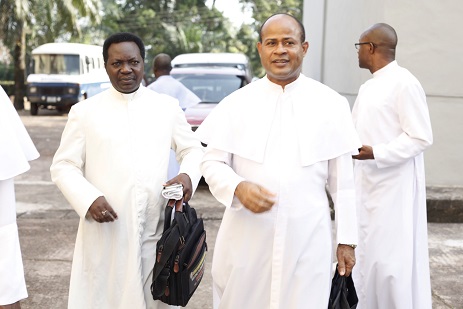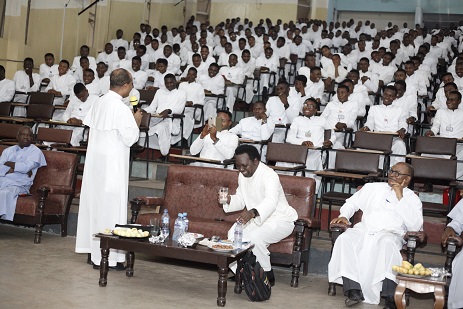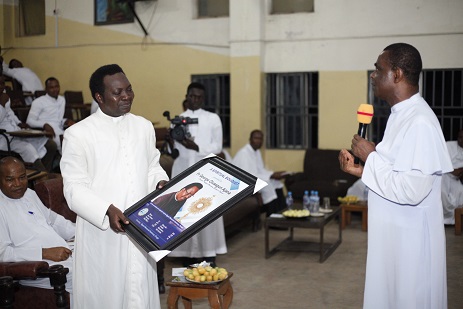Bigard Memorial Seminary on Tuesday, November 19, 2019, played host to the National Director of Missio Nigeria, Rev. Fr. George Olusegun Ajana. Fr. Ajana who doubles as the National Coordinator of Missio Nigeria and West Africa was received in the seminary auditorium where he had an enriching session with the seminarians and staff of the seminary. In attendance also were some external prominent guests among whom were: Rev. Fr. Innocent Nnajike, the Director of Mission Society of Enugu diocese and Sr. Sochinwe Chukwu who is the Enugu diocesan Coordinator of Holy Childhood Association.


It is to be noted that before the Director presented his address, the Rector of the seminary, on behalf of the seminary community, presented kola nut to the visitors as a sign of love and acceptance. The Rector thereafter gave his opening remarks. In his remarks, the Rector x-rayed the roles the Pontifical Mission Societies have played in the history of Bigard Seminary. He noted that Bigard Seminary is one of the seminaries that had benefited directly from the society particularly from the Pontifical Society of St Peter, the Apostle, which is why the Seminary is named after the founder, Jeanne Bigard. He further disclosed that besides the annual subsidies they give to the seminary, the society has also provided fund for some of the projects which the seminary had completed in recent times. The Rector thanked the society through her representative in Nigeria.


The Director had extensive discussion with the staff and seminarians on issues bordering on the apostolate, challenges, and prospects of the Pontifical Mission Societies in Nigeria, nay, World Mission Territories. The Pontifical Mission Society he explained is an institution owned by the Supreme Pontiff dedicated primarily for the projects of evangelization. He explained that the society has four major arms, namely: the Propagation of Faith, the Holy Childhood Association, the Pontifical Society of St Peter the Apostle, and finally, the Pontifical Missionary Union of Priests and Religious. These arms, he said, though autonomous, are under the larger umbrella of Pontifical Mission Society. The societies have one aim – fostering universal missionary spirit through prayers, awareness, and fund-raising.

Going forward, he remarked that it is these societies that are directly responsible for the propagation of faith, sustenance, and evangelization in the mission territories. The societies have continued to support mission through what he explained as ordinary or extra-ordinary subsidies. He disclosed that from these subsidies: financial assistance is given to bishops to enable them take care of some pastoral needs in their dioceses, the offices of the Nuncios are maintained, assistance are provided to the oriental churches, scholarships are provided for the poor and vulnerable children, individual seminarians and formators are maintained, scholarships are provided for priests, churches and other ecclesial projects are funded, and lots more. The director expressed displeasure that in spite of these whooping benefits that come to Africa, Africa bring in very little to the PMS coffer. He, on this note, frowned at the attitudes of some priests who are often reluctant in remitting the proceeds of the World Mission Sunday and the Vocation Collections. This, he said is a sign of ingratitude.

African Churches are at the front burner. He disclosed that maintenance of the churches in Africa claim over 64% of the annual income of the Pontifical Society. He, however, cautioned that Africans should not bank on the benefits they currently receive as they might not endure. He recommended that local churches and seminarians should prepare for rainy days by considering options of self-sufficiency.
There were some contributions, questions, and clarifications. One of the formators, Fr. Dr. Francis Igboanugo enquired if the Pontifical Mission Societies, in any way, help seminaries, and indeed, churches in mission territories, to build self-sustaining projects? There was an enquiry about what the PMS are currently doing as regards the training of facilitators or HCA animators? A seminarian shared his personal experience with the Holy Childhood Association. He explained that instructors and animators are often faced with some challenges like unavailability of instruction materials. All the questions raised were addressed by the director.


The moderator of Bigard Mission Club, Fr. Dr. Clement Obasi gave a vote of thanks. He thanked the director for his insightful and condensed presentations. He thanked him also for what he had done and is still doing in the national missionary work. He thanked equally the seminarians and the guests for their patience. He disclosed to the director, however, that Bigard Seminary is deeply devoted to mission projects. He explained that every year, before the World Mission Sunday, the seminary holds a weekend, traditionally known as the Mission Weekend. This weekend gives the seminarians the platform to cross-pollinate ideas on issues of mission. Experts are invited for paper presentation. And on the Mission Sunday proper, the seminarians are sent out to parishes to help raise funds for mission. He reaffirmed the seminary’s commitment to partner with the universal Church in her missionary project.
Groups photograph were taken after the closing prayer was said by one of the spiritual directors at 18:32hours.

